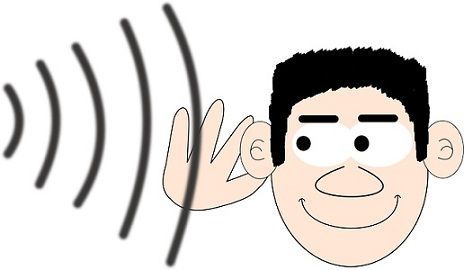 Someone rightly said, “Hearing is through ears, but listening is through the mind.” The two activities hearing and listening involve the use of ears, but they are different. The hearing is nothing but a sense that helps you receive sound waves and noise by ears. It is the power of perceiving sounds.
Someone rightly said, “Hearing is through ears, but listening is through the mind.” The two activities hearing and listening involve the use of ears, but they are different. The hearing is nothing but a sense that helps you receive sound waves and noise by ears. It is the power of perceiving sounds.
On the contrary, listening is when you receive the sound waves and understand it by paying full attention to the words and sentences of the speaker. It is one’s ability to correctly receive and interpret the message transferred by the other party in the process of communication.
For many people, these two activities are one, but the truth is, the difference between hearing and listening is vital. so have a glance at this article to understand the terms completely.
Content: Hearing Vs Listening
Comparison Chart
| Basis for Comparison | Hearing | Listening |
|---|---|---|
| Meaning | Hearing refers to one's ability to perceive sounds, by receiving vibrations through ears. | Listening is something done consciously, that involve the analysis and understanding of the sounds you hear. |
| What is it? | An ability | A skill |
| Nature | Primary and continuous | Secondary and temporary |
| Act | Physiological | Psychological |
| Involves | Receipt of message through ears. | Interpretation of the message received by ears. |
| Process | Passive bodily process | Active mental process |
| Occurs at | Subconscious level | Conscious level |
| Use of senses | Only one | More than one |
| Reason | We are neither aware nor we have any control over the sounds we hear. | We listen to acquire knowledge and receive information. |
| Concentration | Not required | Required |
Definition of Hearing
The natural ability or an inborn trait that allows us to recognize sound through ears by catching vibrations is called the hearing. In simple terms, it is one of the five senses; that makes us aware of the sound. It is an involuntary process, whereby a person receives sound vibrations, continuously.
A normal human being’s hearing capability ranges from 20 to 20000 Hertz, called as audio or sonic. Any frequency above and below the given range is known as ultrasonic and infrasonic respectively.
Definition of Listening
Listening is defined as the learned skill, in which we can receive sounds through ears, and transform them into meaningful messages. To put simply, it is the process of diligently hearing and interpreting the meaning of words and sentences spoken by the speaker, during the conversation.
Listening is a bit difficult, because it requires concentration and attention, and the human mind is easily distracted. People use it as a technique to comprehend, what is being said, through different verbal and non-verbal signs, i.e. how it is being said? What type of words is used? Tone and pitch of voice, body language and so on.
Active listening is the key element; that makes the communication process effective. Further, it encompasses making sounds that show listener’s attentiveness and providing feedback. It had a greater influence in our lives and used to gain information, learn and understand things and so on.
Key Differences Between Hearing and Listening
The following points are vital so far as the difference between hearing and listening is concerned
- An individual’s ability to perceive sounds, by receiving vibrations through ears, is called the hearing. Listening is something done consciously, that involve the analysis and understanding of the sounds you hear.
- The hearing is the primary and continuous in nature, i.e. the first and foremost stage is hearing, followed by listening and it occurs continuously. On the other hand, listening is temporary, as we cannot continuously pay attention to something for long hours.
- The hearing is physiological, which is through one of our senses in the living organisms. On the contrary, listening is a psychological (conscious) act.
- While hearing is a passive bodily process that does not the involve use of the brain. As opposed to listening, it is an active mental process, which involves the use of brain to draw meaning from words and sentences.
- Hearing involves receipt of the message through ears. Conversely, listening encompasses interpretation of the message received by ears.
- The hearing is an inborn ability but listening is a learned skill.
- In the hearing, we are not aware of the sounds that we receive, however in the case of listening, we are completely aware of what the speaker is saying.
- Hearing involves the use of only one sense i.e. ears. In contrast, listening, involves the use of more than one senses i.e. eyes, ears, touch etc. to understand the message completely and accurately.
- In the hearing, we are neither aware nor we have any control over the sounds we hear. On the other hand, in listening, we are aware of what the other person is saying and so we listen to acquire knowledge and receive information.
- Hearing does not require focus whereas listening does.
Video: Hearing Vs Listening
Conclusion
So, with the discussion, it is quite clear that listening is one step ahead of the hearing. The hearing is simply the ability to hear, i.e. natural or God-given however, listening is an acquired skill, which only a few people possess. While the hearing is involuntary and performed effortlessly, listening is done intentionally, wherein we are selective and pay attention to only those messages, we think important for us.






Luisa says
Thanks
Wendy says
Thanks that was absolutely helpful 🤗🤗
Abubakar says
Thanks
Piyush Goyal says
Thanx it’s very useful for me..
Precious Habeene says
Thank you, very useful.
Ricky says
Very interesting.
Thank you
Puseletso says
This was really interesting.
Rutendo Cordellia says
very intresting indeed
S.M. .Anzar Alam says
I found it very vital both as a student as well as a teacher
Great job!!!!
Thanks
ANZAR
Surbhi S says
Thanks a lot to all of you for appreciating and showing your love to Key Differences. Keep reading 🙂
farai says
thank you very much , it sounds clear. may you please keep sharing the other vital concepts in comm skills
Nazarene Harrold says
I teach Life Skills to 6th graders, and I’ve found this publication very useful. Thank you!
Chantal Rowe says
thank you this was helpful
Tobias kenechukwu says
For my PDE assignment on language and communication skills this helped a lot .Thanks you.
Micah Okata says
I learn more from it.
Thanks
Emmaculate Omamo says
Wonderful !thank you I have learnt alot
Brenda Preciado says
Excellent information to share with our coworkers!
Thank you!
Sheryl Barton says
This makes a lot of since. Thank you for the information
Sakinah Madyun says
This is very informative and helpful info to share!
Thank You…..
iman ram says
That was awesome, Thanks
arlene mata says
Thank you for sharing the key differences between hearing and listening. It was informative.
Pete Oraha says
I like it
thank you
Harika says
Very understandable 👌
Thanks…..
Lenaida Clemence Baitani says
Thank you
Olga Yastreb says
Very important information
manpreet kaur says
this content was very useful for my assignment.
Daramy Sheku says
Wow, thank you for letting me know the differences between hearing and listening. It will help alot
Rohit says
Hey, Thank you very much for explaining in a simple and effective way.
Abdussalam says
Thank you
Karen Fitzgerald says
Thankyou for educating on key differences.
Dharshini Suresh says
Well very helpful for my Final exams
Pelagia Macharaga says
Thank you so much for explaining in a simple and effective way